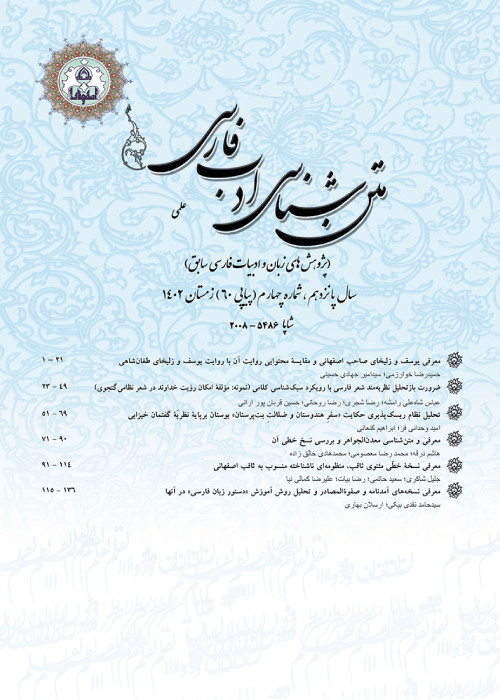The Hypothesis of Belief in the Effect Realization of Speech in Iranian Culture Based on Ferdowsi’s Shahnameh
This article aimed to answer why Iranians have been always avoiding stating the possibility of occurrence of a catastrophic event in the future and why this avoidance has been accompanied by a severe fear about themselves and their loved ones.To answer these questions, we reviewed the sources from the millennia that had been influential in the formation and evolution of Iranian culture. Then, to find the written examples of Iranians refraining from expressing unpleasant situations, we checked the Persian literature and selected Ferdowsi’s Shahnameh from among the Persian poetry and prose texts. We found this book speaking about defeat, captivity, plunder, death, etc., all of which were unfavorable situations. Then, to show the survival of this abstinence to the present day, we referred to proverbs from the folklore literature.Studying such sources showed that since the ancient times, Iranians have believed that speech has a tremendous power when uttered, which can pave the way towards external realization of its content. For this reason, they have tried to refrain from uttering words with an unpleasant theme. Even when there has been no escape from speaking, they have expressed it indirectly.IntroductionThere is much advice in didactic books not to say words that annoy the listener. However, the existence of many instructions for avoiding mentioning annoying and sad words during speaking gave the author the idea that such reminders could not have been aimed at maintaining friendship and avoiding hostility and unpleasant consequences of speech. The study of influential sources on Iranian culture also revealed that the origin of these recommendations was a religious-cultural belief put in the Iranians’ collective unconscious minds. This belief had been expressed in various texts with the spread of Persian poetry and prose and had even found its way into proverbs.Materials and MethodsThis study was conducted via a descriptive-analytical method based on library sources. First, the evidence for the belief presented in this article was gathered from among the views of Hinduism, Zoroastrianism, Manichaeism, Judaism, Christianism, and Islamism, which had kept interacting with Iranian culture for thousands of years. Then, the presence of the mentioned belief in Ferdowsi's Shahnameh was evaluated and finally, the evidence of its existence was studied among the proverbs in the Persian language.Discussion of the Results & ConclusionsThe magical effect of speech and realizing the contents of words by uttering them is a deep belief among Hindus. According to Indian legends, speech has a magical power called Mantra. The realization of the magic of speech depends on its eloquence.The Hindu mantra in Zoroastrianism is written in the form of Manθara that means 'the holy word', especially used as Yaθa Ahu Vairyo in the main prayer of Zoroastrian religion. The evidence to show the spiritual status of the Yaθa Ahu Vairyo prayer is based on the belief that it has been created before any other creation. There are many other prayers in Zoroastrianism that are considered miraculous to recite.The evidence on the origin of the effects of oral speech and external realization of what is spoken exist in Mani's works. Manichaean evidence demonstrates that God’s creation of the spiritual world of Manichaeism has been achieved by words and speech.In the Old Testament, the creation of "enlightenment" is related to speaking with words and their utterance. To remove the darkness, God has bid the light to occur and it has appeared instantly.In John’s Gospel, the term "Word" is mentioned to have been uttered to trigger the beginning of creation. "Word" has been with God and it has been God Himself. It has been with God since the beginning and all things have been created through it.In Islam, the instant utterance and creation made through the content of "Word" belongs to God. God says, “if we want something to exist, we will bid "Exist!" and that thing will exist instantly. Shiite commentators do not believe that the word "exist" is stated by God, while Sunni scholars believe that God uses it imperatively for creation.Studying the related considerable evidence in Ferdowsi's Shahnameh revealed that characters in its stories considered talking about an ominous event as the main step for its external realization. Therefore, they refrained from expressing anything catastrophic in various ways and spoke indirectly about the ominous possibilities of their thoughts.Among the Persian proverbs that are currently common in the Iranian society, we repeatedly observed that saying and uttering a word was considered the basis for its realization in the outside world. For this reason, it was always recommended to mention the blessed events, but not the unfortunate ones that were likely to occur.This belief was found to have been passed down to us from a generation to generation, shaping our curses and blessings over the millennia until today and recommending us to pass it on to future generations as well, whether we like it or not.
- حق عضویت دریافتی صرف حمایت از نشریات عضو و نگهداری، تکمیل و توسعه مگیران میشود.
- پرداخت حق اشتراک و دانلود مقالات اجازه بازنشر آن در سایر رسانههای چاپی و دیجیتال را به کاربر نمیدهد.


